- Home
- Scott Westerfeld
Nexus Page 4
Nexus Read online
Page 4
‘Of course.’ Flicker sent her vision inside the prison walls, found video monitors that showed the five of them plainly. ‘The cameras aren’t affected by whatever Bellwether’s doing. Crash?’
‘You got it.’ Chizara, at least, sounded certain of herself. One by one, the monitors filled with static.
‘I can see the van,’ Ethan said.
Flicker jumped into his eyes. The getaway van was parked on the road that passed the prison – a big Honda, the metal of its hood ornament shining in the sun.
A big silver H.
The second letter on that phantom bracelet. T-H…
‘No,’ Flicker said softly. A memory was welling up, something that threatened to knock her off balance. Something too big to push down. This anguish in her heart was sharper than her fear of being shot.
Chizara squeezed her hand and whispered, ‘What’s wrong?’
‘This new power of Nate’s? I’ve seen it before.’
Not just seen it, needed it. It was something she’d desperately missed all this time, but without knowing why.
But she had to keep control. She was the leader now.
‘It’s okay,’ she managed.
‘It’s so not okay.’ Ethan’s voice sounded afraid. ‘A busload of freaking guards is coming right at us!’
Of course – someone had spotted the unauthorized vehicle sitting out here. With nothing else in sight, the van was the only thing they had to focus on.
When it started to roll away, the guards would start shooting.
‘Crash the bus’s engine!’ she ordered.
‘I can do better than that,’ Chizara said. A moment later: ‘Ha! I’ve got it going in circles.’
‘Whoa,’ Mob said. ‘Now they’re really pissed.’
‘Move! Before they figure out how to stop it!’ Flicker pulled them into a run.
‘We’re ready to go!’ Crash cried, and ahead of them the van rumbled to life. Flicker heard the chunk and whir of automatic doors rolling open.
‘Don’t let go of me till you have to!’ Nate warned.
Flicker cast her vision back. ‘It’s okay. Everyone’s watching the runaway bus now.’
As they piled into the van, her fingers slipped from Nate’s, and at last the world was sharp and real again.
Flicker sucked in huge breaths of relief. The anguish had snapped away.
It had been just been Nate’s strange new power. There was no real memory behind this formless sadness.
They’d won! Nate was free, and she had led the rescue.
‘Thanks for the assist, Bellwether,’ she said as the van began to roll. ‘Did you learn that trick in prison?’
‘No. I learned it from Anon.’ He frowned at her; then his eyes darted around the van. ‘Where is Thibault? Didn’t he come?’
Everyone looked at Nate in confusion.
‘Who the hell is Teebo?’ Ethan asked.
Flicker pulled her vision back into her own head. Her hand went to her wrist, where the guilty memory of a bracelet still lay against her skin. She felt braille letters there…
T-H-I-B-A-U-L-T.
Not a nonsense word: a name. And along with it came an image – a face with dark eyes and full lips, the pale curve of an ear peeking out from long dark hair. The boy called Nothing, whom she had created from stories with her own sister, and who had turned out to be real, to be beautiful, and yet—
She’d lost him. Left him behind like a kid leaves a toy on a bus seat.
‘No.’ Flicker dropped her hand from her wrist, but the memories kept coming. His parents had abandoned him in the hospital, and now she’d done the same thing. ‘How did we all…’
‘What’s wrong?’ Chizara asked from behind the wheel, her voice still bright with triumph. ‘Is someone following us? I’ll crash the hell out of them!’
Flicker gave a low moan, like the sirens fading in the distance. She remembered everything now.
‘I forgot him, Nate. We all just forgot him.’
The pain was just beginning.
THE PICKUP PULLED OFF THE HIGHWAY AND STOPPED. The driver got out and slammed the door.
The boy lying curled in the truck bed woke up, saw redwoods the size of rocket ships rising around him, disappearing into morning mist.
He sat up and watched the driver walk into the woods to squat and pee. A path led off among the misty trees, signposted Damnation Creek Trail.
And now the boy knew where he was – where he’d been heading all along, following nothing but instinct. Knew enough to clamber up onto the rim of the pickup and drop his ratty backpack on the ground.
The driver had put some supermarket bags in the back, their contents showing through the plastic. The boy’s stomach sent hunger pangs up to his higher self – they were connected like two tin cans with a string between them, sometimes taut and sharp, sometimes slack and useless. He pulled bananas and a box of muesli bars out of the bag and dropped to the ground beside the pickup.
His right boot made a clopping sound as he landed. The outer sole was starting to peel away. He didn’t care much.
Making for the trailhead, he passed directly across the driver’s path. His hand moved in some half-remembered gesture, but it wasn’t necessary. She saw nothing.
Even this far from a crowd, no one saw him.
He was nothing.
Behind him at the pickup door, the woman paused to let out a belch, thinking she was alone. Knowing she was alone. Then she got in and turned the key in the ignition. The boy paused, enjoying his relief as the noise of that exhausted old engine faded.
It was good to walk away from the road. It was good to float among these enormous trees. They were so straight, so solid, so still. They smelled fresh and alive. Ferns and rhododendrons and giant huckleberry bushes crowded their feet.
He’d been here before, in summer, back when he’d had a name. Back then, the morning mist had slowly burned off in the sun. Now it was winter, and this lovely noise-dampening blanket would lie across the forest all day. It was cold but not freezing, nothing his distant body couldn’t handle.
Far off he could feel the mist on his face, and it felt good.
He saw himself stumble, a tree root across the trail ripping away more of his boot sole. His stride adjusted, his right foot lifting a little higher.
The trail climbed away from the highway, crested, then took him downhill. The ferny, clouded quiet closed in, punctuated by water drips and a few birdcalls.
He heard his own footfalls on the trail, squelching on damp leaves, cracking twigs, his broken sole clopping. The loudest creature in this world. All around him animals were frozen in their tracks, birds on their branches, alert to the noises of his body moving past.
Part of him wanted to sing out loud, to make the biggest noise he could, to prove to himself that he existed. But he also wanted to stand still, breathe silently, melt away into the quietness all around. Maybe forever.
He’d drifted back and forth between these two desires since the day he’d pushed the world away. Since he’d seen up close what a crowd could do, what he himself had done with a handgun.
Seeing that had made everything impossible.
Mostly he floated and drifted, admitting nothing, seeking nothing, content to belong nowhere.
But then the thought would niggle: he hadn’t always drifted, had he? He ought to be, ought to exist. Someone, somewhere, had once remembered him.
And then he’d wake up somewhere new.
Like that impersonal hotel room, high above the town. There’d been a fridge full of packaged food, so he’d stayed there a while, staring out at the view, waiting for clearer memories to come.
Until the invasions of staff, exclaiming, whirling in and out. A big bowl of fresh fruit had appeared, and his body had almost cried out at the sight of it. He remembered fruit in his hands, the taste of it.
But then hotel guests had charged in. An executive shouting on her phone, her husband rushing to make them drinks.
&nbs
p; He’d slid out the door unseen as their cart full of expensive luggage trundled in.
Another time he’d awoken on a scaly old leather armchair in an attic. He’d had the impression of sleeping there, with someone: skin-to-skin contact, long embraces. Were they his memories, or stories someone had told him? Things he’d once wanted, and didn’t care about anymore?
A girl had come up the folding ladder while he sat there. She was his age, a little gothy-looking. She’d stayed a long time in the armchair, staring at the wall. Not the girl he’d kissed that time, but close enough to be her twin.
She’d sunk her head in her hands. Apologized, not to him, but to someone whose name faded as it left her lips.
Then there was that other place, the room memory claimed was his, except that it was full of lace and chintz. He’d wandered around the unheated, vacation-empty house, down the stairs, and stood disoriented in the hall. Everything was tidy, every picture aligned neatly on the walls. But he could feel a storm in his gut, things torn, permanently disarranged…
Then an old theater building in the Heights, barred with fluttering police tape. His body standing, shuddering on the trash-strewn sidewalk. Another room that was his, turned upside down. Steel doors and windows, barricaded stairs, a sick memory of people fleeing, hurting, disappearing from his life. And when he stepped out of the building – sweating in spite of the cold – the emptiness hit him from every direction. The empty used-car lot across the empty street. He shouldn’t stand here, under this window. He shouldn’t be here—
It’s okay, he told himself. I’m not there anymore. He made himself take deep breaths of the piney air.
He’d drifted up the coast on buses, in RVs, in pickups and cars. He might have even driven a little way in an SUV he found idling outside a convenience store – he remembered concentrating hard to stay on the cliff road. It was easier to sneak into someone else’s car and let them take him north.
Now the trail was winding along through slimmer, more thinly scattered redwoods, their bark pale gray, like ghosts.
And he still warred with himself. Was he here in this familiar place to reconnect with the world? Or to fade away forever?
He paused to get rid of a small pinecone that had wedged itself into his broken boot sole.
Someone else had been with him that summer, the last time he was here. They’d walked down this path together, and their voices had gone back and forth in conversation. Like normal people.
Who had that guy been? All he recalled was an impression of a person trying hard, putting in effort to see him, to know him, like no one ever had before.
A friend. Where was that friend now?
In a bad place, the boy’s gut told him. Was he supposed to wake up from this misty dream and help him? What had happened?
You don’t want to go there, his gut said.
He pulled back from thinking and just walked, carrying the food instead of eating it, following the switchbacks of the path through the fog-wrapped wood.
Scraps of jokes from that summer, puzzling and unfunny, floated through the boy’s head. Carefully he skirted the places where the path all but slid away down the slope.
Up ahead was the sea. A foghorn sounded, and he smelled salt in the air. He could hear the creek running below, and searched the fog beyond it for the far bank.
His whole mind was full of this fog. Sometimes he had the energy for groping in it, catching hold of stuff. Sometimes he just wanted to let it blur everything from his mind forever.
At last he found a rough stairway that led down to a cove. The tide was out. He climbed down, crossed the gravel beach to the wet gray rocks.
A tide pool gleamed there, reflecting the fog. Two pink-legged crabs darted under a ledge at the boy’s approach – animals could always see him. He crouched, leaned over the still water.
There was that face he’d glimpsed in shop windows. Thinner than he remembered, and the beard had grown in. He held his long hair back to get a real look at the uncertain face above the beard, the eyes that hardly knew what they were looking for.
Poor sucker. Maybe he should just walk into that ocean, let the waves take him at last.
The boy raised his gaze to the ripples rushing white on the beach gravel, to the rocks cragging up from the sea into the fog, remnants of a coastline chewed away by tides and storms.
This beauty would remain whether he was here to see it or not.
In the meantime, the sea sound would rinse away this troubled feeling. He would play the game that long-ago guy had shown him, whacking stones into the sea with a washed-up stick.
Driftwood baseball.
The boy smiled, pleased to have remembered.
As he stood, the sole of his boot caught on a rock and ripped again. Two thirds of it was flapping loose now. It was practically useless.
He bent down and untied the bootlace, pulled the boot off. Pulled off the wet sock, too. The cold, solid rock underfoot felt good, real, right.
So he took off the other boot. He tucked the socks deep into the boots’ toes and hurled them one after the other as far out into the water as he could. They splashed and then bobbed on the surface, like they couldn’t decide which way to swim.
He turned and picked his way back across the rocks, scanning the beach for a good driftwood bat.
‘WE HAVE A FRIEND WHOSE POWER IS BEING FORGOTTEN,’ NATE SAID. ‘His name is Thibault.’
The other Zeroes stared at him, their faces full of bafflement and pain. They’d all forgotten Anonymous, and the frantic drive to the safe house had only confused them more.
The escape route had been full of police cars and roadblocks, a vast search for a gang of terrorists fleeing a supermax breakout. Flicker had taken command, guiding Chizara to play havoc with the pursuit. They’d changed vehicles twice and left a hundred stalled cars blocking traffic in their wake.
But here at the safe house, Flicker had switched off. She sat in the big armchair by the fireplace now, her attention hidden away inside herself.
‘It’s not your fault you all forgot him,’ Nate said. ‘That’s just how his power works.’
This felt familiar, standing in front of his team, willing them to pay attention, but it was also different. Harder. They didn’t accept his leadership as easily as they once had.
They kept looking at Flicker, but she was wrapped up in her pain.
‘But we remember him now,’ Chizara said. ‘And we used to know him. How did we forget him all that time?’
Nate shook his head. He had a theory, but not one he could share. The truth would hit them too hard, especially Flicker.
The wind blew outside, and a cold draft coiled into the room. Ethan had bragged that the safe house was one of several he’d talked caretakers into handing over the keys for. Remote cabins were easy to scam in the middle of winter, it seemed.
Maybe a little too remote for Kelsie. She looked lost in this crowdless place. Judging by the long private road to the cabin, the five Zeroes were the only people for miles around.
But after his weeks in isolation, even this small group felt glorious to Nate. His power was easing back into his bones.
‘He lived down the hall in the Dish,’ Kelsie said softly. ‘With a sign on his door to remind us how to pronounce his name.’
Nate could feel her sadness pulsing in the group, her power linking their emotions. Chizara was still angry about what he had done back at the prison, and Flicker’s heartache keened through them all like the cold wind outside.
She and Thibault had been in love, and she’d forgotten him.
‘We were buddies,’ said Ethan from the far end of the couch. ‘He lived in that awesome hotel room, and we played this video game. I had to remember he was sitting there next to me!’ His thumbs twitched at the memory.
‘We all found ways to keep him in our minds,’ Nate said. ‘But somehow he was forced out of yours.’
Chizara said darkly, ‘On the day you shot Swarm, right?’
Nat
e hesitated only a moment before nodding.
Too far away to see the shooting, the others all believed what the news said – that Nate Saldana was a murderer.
They couldn’t learn that Thibault had pulled the trigger. Not while they were still reeling.
Nate needed to heal the group first. He needed them functional.
Something big was happening in New Orleans, something involving Zero powers, and he wanted to be there in full force.
Flicker spoke up. ‘What if this means Thibault’s dead? He always worried that if he ever died, he’d just…disappear.’
‘That’s not why you forgot him,’ Nate said. ‘Everything went to hell that day. You lost the Dish, you lost your families, and you’ve spent every moment since on the run. It’s amazing you remember your own names, let alone Thibault’s!’
He paused, letting that soak in, and for a moment he almost believed it himself. They all looked like they’d been camping for months. Bedraggled and exhausted, wearing cheap clothes scammed by Ethan from roadside stores.
‘Wait,’ Flicker said, the fingers of one hand encircling her other wrist. ‘The day before we left Cambria, Thibault’s mom was going crazy, because she never knew if he really existed or not. So he went through his family’s house, trashing all the pictures they had of him, every reminder he could find. He erased himself from their memories once and for all.’
‘Harsh,’ Ethan said. ‘But why did we forget?’
Flicker’s voice dropped. ‘He was so sad, so lost. Maybe in all the emotions after Swarm got killed, his power got too strong.’
‘Yikes.’ Ethan let out a low whistle. ‘Bad things happen when we level up.’
He glanced at Kelsie, then stared guiltily at the floor.
‘Don’t worry, Ethan,’ she said. ‘I was just in a prison full of killers, and I didn’t turn into a Swarm.’
‘Duh,’ he said. ‘You’re over that whole thing.’
‘No’ came a soft answer. ‘I’m not.’
Chizara took Kelsie’s hand, her eyes still alight with the power of crashing a hundred cars. ‘And I managed not to release any of those killers, even with Nate trying to make me. But if Anon leveled up that day, maybe he wasn’t so lucky.’

 Uglies
Uglies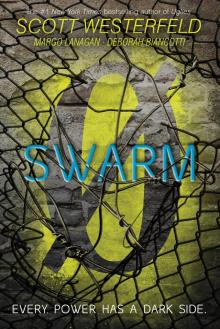 Swarm
Swarm Pretties
Pretties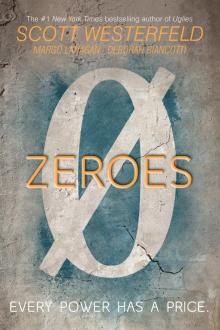 Zeroes
Zeroes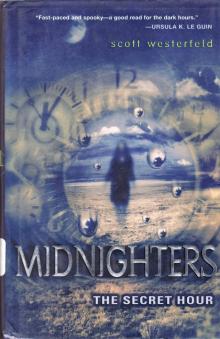 The Secret Hour
The Secret Hour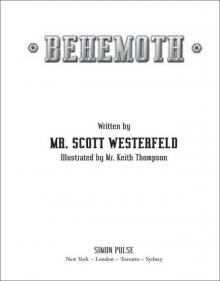 Behemoth
Behemoth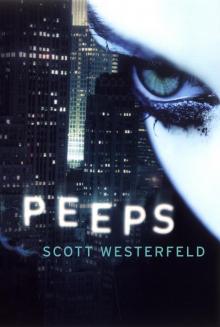 Peeps
Peeps Specials
Specials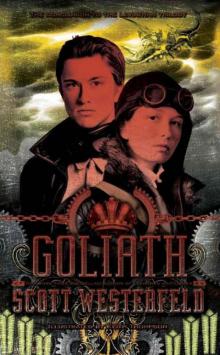 Goliath
Goliath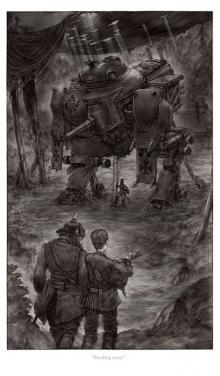 Leviathan
Leviathan Extras
Extras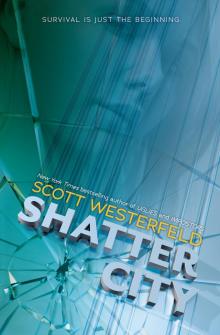 Shatter City
Shatter City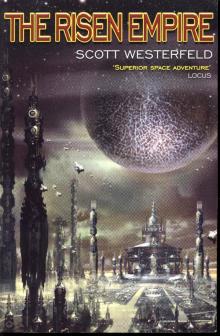 The Risen Empire
The Risen Empire Touching Darkness
Touching Darkness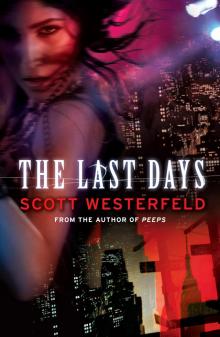 The Last Days
The Last Days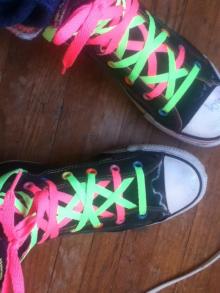 So Yesterday
So Yesterday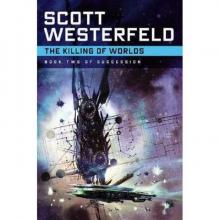 The Killing of Worlds
The Killing of Worlds Afterworlds
Afterworlds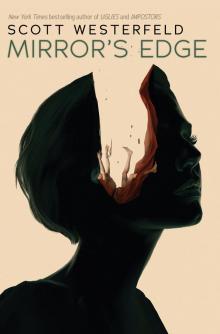 Mirror's Edge
Mirror's Edge Evolution's Darling
Evolution's Darling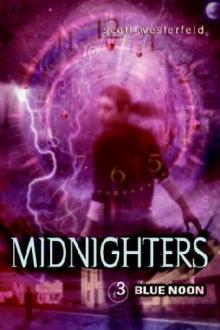 Blue Noon m-3
Blue Noon m-3 Touching Darkness m-2
Touching Darkness m-2 Impostors
Impostors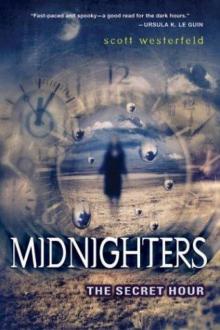 The Secret Hour m-1
The Secret Hour m-1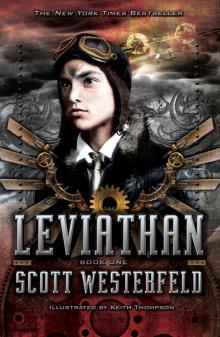 Leviathan 01 - Leviathan
Leviathan 01 - Leviathan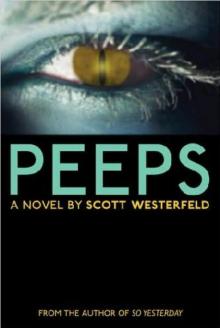 Peeps p-1
Peeps p-1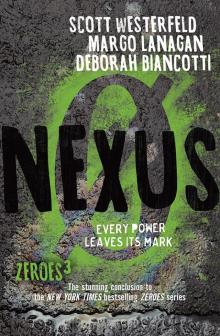 Nexus
Nexus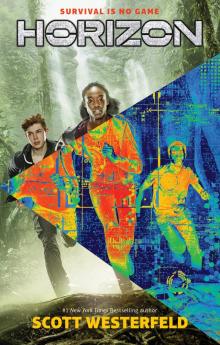 Horizon
Horizon Bogus to Bubbly
Bogus to Bubbly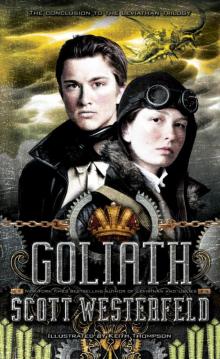 Goliath l-3
Goliath l-3 The Last Days p-2
The Last Days p-2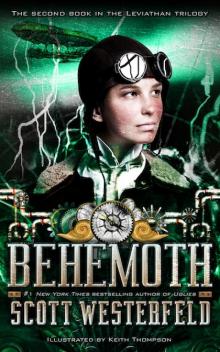 Behemoth l-2
Behemoth l-2 Stupid Perfect World
Stupid Perfect World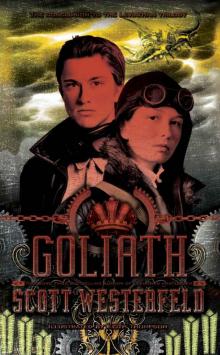 Goliath (Leviathan Trilogy)
Goliath (Leviathan Trilogy)